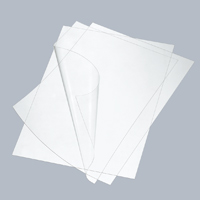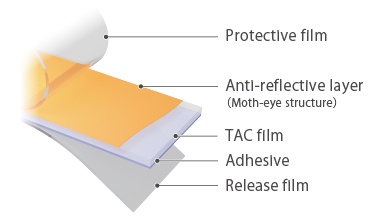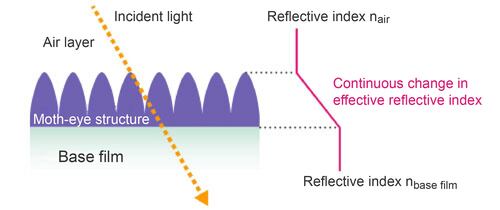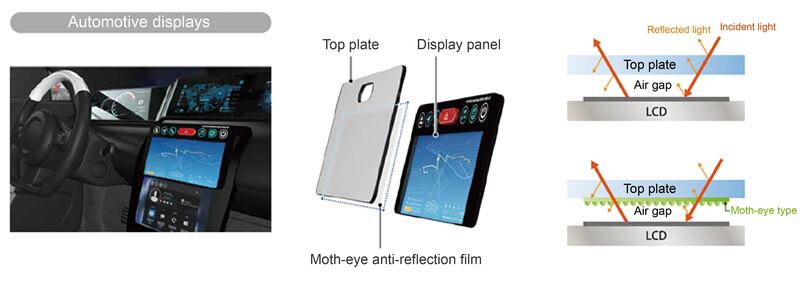About Our
Products
- Home
- Products
- Anti-reflection film
- Anti-reflection film Moth-eye type
Anti-reflection film
Anti-reflection film Moth-eye type
This anti-reflection film features a nano-level moth-eye structure formed on the surface.
-
- Product name
- ME1-T050P-510P
-
- Features
-
- The moth-eye surface structure ensures low reflection and high transmittance in a wide range of wavelength bands from visible light to near-infrared light.
- Improves the visibility of projected images and mitigates ghost images caused by multiple reflections.
- The moth-eye structure produces less variation in hue of reflectance dependent on viewing angles.

Related articles
Structure

Mechanism of reflection reduction | Light transmission visualization

Ideal for automotive displays and head-up displays.

■ Characteristics

■ Test data
| Product name | ME1-T050P-510P | Test conditions | |
|---|---|---|---|
| Luminous reflectance *1 | % | 0.2 | - |
| Hue of reflectance *1 | a* | 0.3 | - |
| b* | 0.3 | - | |
| Transmission hue *1 | a* | 0.0 | - |
| b* | 0.3 | - | |
| Haze *2 | % | 0.2 | JIS K7136 |
| Total transmittance *2 | % | 95.3 | JIS K7361 |
- Test conditions:
・ Transmittance and reflection were measured after applying the film to glass.
・ Additionally, reflection was measured with black PET applied to the rear surface. - *1Measuring device: V-650 (JASCO Corporation
Incident angle: 5° (reflection), 0° (transmission)
Light source: D65 - *2Measuring device: HM-150 (Murakami Color Research Laboratory)
Test standards: JIS K7136 (ISO 14782) (haze), JIS K7361 (ISO 13468-1) (transmittance)
caution
The moth-eye film has structural characteristics that make it difficult to completely remove smudges from the surface. Therefore, applying it to areas frequently in contact with hands or dirt is not recommended.
caution
Note on the characteristic data given - Data on the characteristics of the products described in this page based on the results of evaluations carried out by the company. This does not guarantee that the characteristics of the product conform with your usage environment. Before use, review the usage conditions based on evaluation data obtained from the equipment and substrates actually used.








